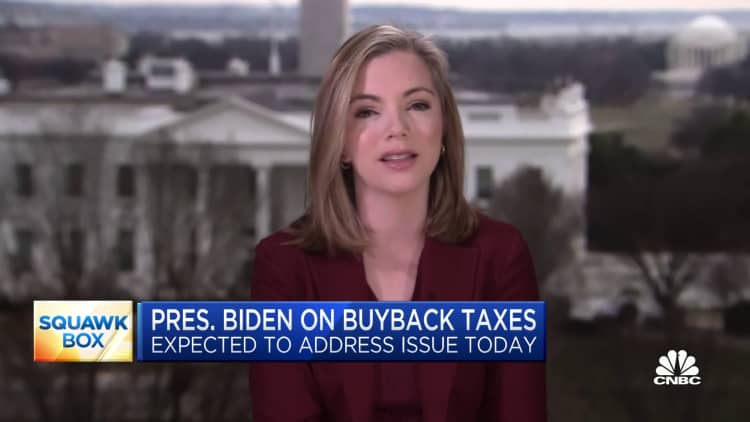A "major blow" was how corporations described the failure by Capitol Hill late last year to extend an expiring tax provision of the 2017 Tax Cut and Jobs Act which allowed for full and immediate deduction of research and development costs from taxable income. The fate of that corporate tax policy, supported by many Democrats, had been linked to the Democratic Party's desire for a deal on the child tax credit.
But the dollar figures remained far apart and a compromise never materialized. Now the fight is back over these tax provisions pitting corporations and families as each others' best chances, or depending on how you look at it, obstacles.
A new report out Wednesday from the Information Technology and Innovation Foundation (ITIF), a science and technology policy think tank, is pushing the case for the R&D tax provision as a matter of job creation.
Current tax law prevents firms from expensing the full value of R&D investments in the first year, and instead uses a five-year depreciation schedule. In its report — which not only calls for restoration of the R&D credit but a doubling of the rates — the think tank estimates that 269,000 R&D jobs would be created in the U.S. Just restoring the tax credit would create 81,000 direct jobs, while doubling the tax credit rates would create another 188,000 jobs.
"Companies aren't investing enough in R&D and new equipment to spur innovation, productivity, and growth across the economy. One reason for that is that R&D tax incentives in the United States are well below those of other advanced economies," said ITIF analyst, Ian Clay, in the report's release. "The recent removal of first-year full expensing of R&D expenditures has only worsened these problems."
Job creation is always a good talking point to bring to a legislative fight. According to PwC, 75% of R&D spending is on wages, connecting the dots between a higher cost of R&D and reduced employment.
But the new ITIF report represents the blocking and tackling that always needs to be done by interested parties, and given the failure last year to reach a deal, job creation forecasts alone aren't likely to be a game-changer in a divided Congress. Still, House and Senate members are getting ready to reintroduce legislation on the R&D tax credit. In the House, Kansas Republican Ron Estes and Connecticut Democrat John Larson are expected to bring forward a bill. In the Senate, Indiana Senator Todd Young and New Hampshire Senator Maggie Hassan are expected to draft bills.
"Our American economy needs permanent, immediate R&D expensing, and I'm looking forward to reintroducing the bipartisan solution – the American Innovation and R&D Competitiveness Act," Estes said in a statement provided by his spokesperson. "Now that the tax provision has expired, I think there's greater urgency to pass this bill so that we can experience the benefits of American innovation and job creation in the United States."
Hassan is expected to keep pushing to enable businesses to fully deduct R&D expenses each year, according to Capitol Hill sources, but her office declined to comment on any specific timeline for draft legislation.
Representatives for Sen. Young and Congressman Larson did not respond to requests for comment by press time.

In any event, finding sponsors for the R&D bill has never been the issue. Last year, there were well over 100 sponsors in the House and roughly 40 in the Senate.
Late last year, a hopeful Democratic Senator Ron Wyden of Oregon told the CNBC CFO Council Summit in Washington. D.C., that he was a big proponent of the R&D tax credit. But the issue has been the wide gap between the GOP and Democratic Party over a deal that includes a larger child tax credit. At the same CNBC event, former GOP House Ways and Means Committee leader Kevin Brady of Texas said the parties were far apart on a reasonable compromise that included corporate tax priorities and a child tax credit he estimated at $120 billion.
That gap hasn't disappeared, and politicians reintroducing legislation they are already on record as supporting isn't going to move the legislative needle on its own. But there may be at least a little room for optimism.
The ITIF says it expects legislation to be introduced later this month.
Reasons for a little more 'marginal' legislative confidence
Rohit Kumar, national tax policy services leader at PwC and a former top aide to Mitch McConnell, said the exact timing isn't all that important, but he does expect bipartisan bills in both the House and the Senate in the coming months, with his bet that the Senate moves first. "I feel a little more confident about the Senate. The strength of emotion in the Senate is stronger," he said.
Overall, though, he said the legislative reality has only changed "marginally."
With the House having changed control, GOP resistance to a child tax credit without a working requirement for the parent may no longer be as big an obstacle as it has been in the past. "If you couldn't get it last year, you are certainly not getting it this year," he said, meaning Democrats will have to budge on that issue if they want a deal. "That makes it maybe an easier transaction to sell to those who might have resisted," he said.
Missouri Republican Jason Smith, the GOP leader of House Ways and Means and Budget committees, is on record as a supporter of the child tax credit, and introduced legislation earlier this year specific to expanding child tax credit payments for pregnant women.
As a starting point, there should be room to negotiate over at least making the child tax credit that was doubled in 2017 permanent since that was GOP-led legislation. It is set to expire in 2025. Indexing the child tax credit to inflation would also be a matter of tax policy that both parties might agree on as a way to enshrine future increases in law. The 2017 doubling of the child tax credit did not include an inflation index, and that is a much larger issue now. Though regardless of where the economy is with inflation, it's just good tax policy to index for inflation. "Even with low inflation, the benefits over time erode," Kumar said.
That's an issue cited by ITIF in its new study as well, in its call for not only restoring the tax credit but doubling the rate.
There are already signs from the economy that R&D investment is slowing. According to Kumar, PwC's internal research team recently found that private investment in R&D declined for two quarters in a row, Q3 and Q4 2022, for first time in seven years.
No single study or signal from the economy is going to usher a bill into law, but in a slowing economy with CEOs already feeling cash constrained, "a huge tax hit is not helpful," Kumar said. "And if you know 75% of R&D is spent on wages, the jobs data, the study, the layoffs in tech, the decline in private investment, all help tell a story. It's not good for the economy or jobs."
Kumar told us earlier this year that the best hope for this measure to get attached to broader legislation with momentum on Capitol Hill is tied to the 1099-K tax income issue related to payments made through online platforms, including Venmo and PayPal, which had been scheduled for the 2022 tax year but was scuttled amid backlash late last year.
"That thing is really starting to move," Kumar said. The Biden administration needs statutory relief and that has to happen before the end of the year. The Senate passed a bill on the issue by unanimous consent at the end of last year, though it was too late for the House to take up a similar measure.
"At the margins, all those things make me feel there is certainly a chance something happens this calendar year on the issue," he said. There is also precedent for making this type of tax provision retroactive, so the 2022 tax year could be included.
But there's still the divide on the corporate tax priorities and child tax credit, and at a basic level, getting a bipartisan tax bill through the House and Senate and to the White House is always challenging. The reality is that the R&D tax measure, left alone, does not have the draconian consequences of a debt ceiling fight and fiscal cliff. "It's still a long putt," Kumar said.
The effort comes in a year during which Capitol Hill is headed for a summer showdown over the debt ceiling, and a new projection from the Congressional Budget Office released on Wednesday that forecast $19 trillion more in government deficit over the next decade, 20% higher than its previous forecast. Debt held by the public is projected to rise in relation to the size of the economy each year, reaching 118% of GDP by 2033, the CBO wrote in its new budget outlook, "which would be the highest level ever recorded."
But now is the time for corporations to make their case. Many companies were surprised that the R&D tax credit did not get extended in the late year legislative package because it had so much bipartisan support. "These things don't happen on their own. You have to make the case," Kumar said.
Correction: Private investment in R&D declined for two quarters in a row, Q3 and Q4 2022, for the first time in seven years. An earlier version of this article misstated the quarters covered by the research.






